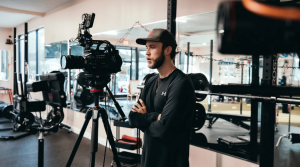Lights, camera, action! If you have a passion for capturing moments and telling stories through the lens of a camera, then becoming a videographer might be your calling. In this comprehensive step-by-step guide, we will walk you through everything you need to know about starting a career in videography. From understanding the role of a videographer and exploring the different types of videography to learning how to become one yourself, we’ve got you covered. We’ll also address the burning question of whether videographers are in demand and shed light on the potential income opportunities in this field. So grab your camera and get ready to embark on an exciting journey into the world of videography!
What is a Videographer?

A videographer is a professional who specializes in capturing and creating high-quality videos. They use cameras, lighting equipment, and other tools to record and produce videos for various industries such as film, television, business advertising, weddings, and events. Their responsibilities include setting up shots, framing the scene, operating the camera, and editing the footage to create a final product.
Are Videographers In Demand?

Yes, videographers are in high demand in today’s digital age. With the rise of social media platforms and the increasing popularity of video content, businesses and individuals are seeking professional videographers to create engaging and high-quality videos. From corporate events and weddings to promotional videos and social media content, there is a wide range of opportunities for videographers to showcase their skills and meet the growing demand for video production. Additionally, with advancements in technology making video equipment more accessible, more people are also pursuing videography as a career, further contributing to the demand for skilled professionals in this field.
What Does a Videographer Do?

A Videographer is someone who helps create and manage video content. This can include filming, editing, and creating multimedia presentations. Videographers may also help create marketing materials or videos for businesses.
Videographers can use a variety of tools and software to create their videos. They may use digital, video, or computer software to capture footage. After the footage is collected, videographers will likely edit it using Adobe Premiere or Avid Media Composer software. They may then add music and sound effects to make the video more customized and cohesive.
Some videographers work independently, while others work for businesses or organizations. Some videographers freelance, while others are commissioned based on the type of video they are creating. Regardless of the scenario, most videographers need adequate writing skills in order to provide clear instructions for their clients. Additionally, good communication skills are necessary because many clients request revisions and changes before final product delivery.
How to Become a Videographer?

Becoming a videographer requires a combination of technical skills, creativity, and business acumen. Here’s a step-by-step guide to help you get started on your journey to becoming a videographer:
1. Learn the Basics of Videography
Familiarize yourself with the fundamental concepts of videography, such as camera operation, composition, lighting, sound recording, and video editing. There are various online tutorials, courses, and books available that can help you grasp the essentials.
2. Invest in Quality Equipment
While you can start with basic gear, investing in a good camera, tripod, microphone, and editing software will significantly improve the quality of your videos. Research different options within your budget and consider both DSLRs and mirrorless cameras, as they offer excellent video capabilities.
3. Practice Regularly
The more you practice, the better you’ll become. Start shooting videos regularly, experimenting with different techniques, and challenging yourself to improve with each project.
4. Explore Different Genres
Videography covers a wide range of genres, such as documentaries, short films, event coverage, corporate videos, music videos, and more. Experiment with various styles to find what interests you the most and where your skills shine.
5. Build a Portfolio
Create a portfolio to showcase your best work. This can be a website, a YouTube channel, or any platform where potential clients or employers can view your videos. Make sure your portfolio is organized and reflects your skills and style as a videographer.
6. Network and Collaborate
Attend industry events, join videography forums or online communities, and network with other videographers, filmmakers, and professionals in related fields. Collaboration can lead to valuable experiences and opportunities for growth.
7. Take Formal Education (Optional)
While not strictly necessary, formal film or media production education can provide you with a solid foundation and access to resources and connections. Consider enrolling in a film school or taking relevant courses at a college or university.
8. Intern or Assist Others
Working as an intern or assistant for established videographers or production companies can be an invaluable learning experience. You’ll gain hands-on knowledge and insights into the industry while building connections.
9. Stay Updated with Technology and Trends
The videography industry is constantly evolving with new technologies and trends. Stay updated with the latest camera software and technological advancements es to ensure your skills remain relevant.
10. Market Yourself and Seek Opportunities
As you gain more experience and confidence in your abilities, start marketing yourself as a videographer. Utilize social media, create a professional website, and reach out to potential clients or employers. Be proactive in seeking projects and opportunities.
Types of Videography

Videography encompasses various types, each with its own unique focus and purpose.
1. Advertising Videos
Advertising videos are a great way to promote products or services and capture viewer attention. These videos often employ Creative storytelling techniques to engage the target audience and achieve marketing objectives. Attention to detail and strong visual storytelling skills are essential for creating impactful advertising videos that contribute to brand awareness and sales growth. Advertising videographers are like cinematographers who understand how to create compelling video content. They may work as freelance videographers or be part of a larger crew for big-budget projects like music videos or feature films.
2. Film and TV Video
Film and TV videography involves capturing footage for movies, television shows, or documentaries. It requires knowledge of storytelling techniques and camera operation, often working with a team to bring scripts and concepts to life.
Film and TV videographers may use advanced equipment and techniques to achieve cinematic visuals and professional results. This field offers opportunities to work on diverse projects and collaborate with industry professionals. From music videos to feature films, film and TV videography is a great way to showcase creativity and technical skill.
3 Corporate Video
Corporate videos serve as a powerful tool for businesses to promote their brand, products, or services. This form of videography encompasses a wide range of content, including interviews, testimonials, product demonstrations, and behind-the-scenes footage. To create an effective corporate video, videographers must deeply understand the company’s goals and target audience.
Attention to detail and strong communication skills are crucial in accurately capturing the company’s message and portraying its brand identity. Corporate videography offers promising career opportunities, both as a freelance videographer or in full-time positions.
4. Drone Video
Drone videos provide a unique perspective that captures breathtaking aerial shots and dynamic movements, adding depth and visual interest to storytelling. These videos offer a cinematic experience for viewers, making them an engaging and immersive form of videography. Drones are versatile tools that can be used in various types of videography, including real estate, travel, and events.
However, using drones in videography requires technical skill and knowledge of flight regulations and safety precautions to ensure responsible and legal drone operation. With the increasing popularity of social media platforms like YouTube, drone videography has gained significant traction, creating exciting opportunities for videographers to showcase their creativity.
5. Education Video
Education videos serve as a valuable tool for instructional purposes in both traditional classroom settings and online platforms. These videos require videographers to understand educational principles and effective instructional techniques deeply. Collaboration with educators or subject matter experts is often necessary to ensure the content’s accuracy and relevance.
Education videos utilize clear and concise visual communication to convey information to viewers effectively. They can be used to supplement traditional teaching methods or deliver complete courses online. Videographers who specialize in creating educational videos play a crucial role in helping learners grasp complex concepts through engaging visual content.
6. Music Video
Music videos offer videographers a creative platform to combine visuals and music, telling compelling stories through their work. Collaborating with musicians, directors, and production teams is essential in creating successful music videos. Understanding the tone and style of the music is crucial for videographers to create visuals that complement the song effectively. Music videos often incorporate choreography, special effects, and unique camera angles to produce impactful visuals that captivate viewers.
7. Product Demo Video
Product demo videos are a great way to showcase the features and benefits of a product in action. They are commonly used for marketing and sales purposes, helping to educate potential customers about the value and functionality of a product.
These videos often incorporate voiceovers, text overlays, and music to enhance the viewer’s experience and make the product more enticing. Whether it’s through live-action footage, animation, or a combination of both, product demo videos offer an effective means of engaging with your audience and promoting your offerings.
8. Real Estate Video
Real estate video is a specialized form of videography that focuses on showcasing properties for sale or rent. These videos often include aerial shots, interior footage, and virtual tours to give viewers a comprehensive view of the property.
Videographers in this field may need to work closely with real estate agents and homeowners to capture the best aspects of a property. Lighting and composition are crucial in real estate videos to highlight a property’s unique features and appeal. It’s essential to pay attention to detail and have the ability to tell a compelling story through visuals.
9. Travel Video
Travel videography presents an opportunity to capture the beauty and experiences of various destinations. It requires meticulous planning, effective storytelling skills, and the ability to capture stunning visuals. Travel videographers must be adaptable, as they often work in different environments and conditions. The essence of travel videography lies in showcasing a place’s local culture, landmarks, and natural wonders. Post-production editing plays a vital role in creating compelling travel videos and enhancing storytelling and visual appeal.
10. Mobile-First Video
Mobile-first video production is gaining popularity due to the convenience and accessibility of smartphones. It provides a quick and easy way to film, edit, and share videos on social media platforms. Thanks to advancements in smartphone technology, mobile-first videos can have high-quality visuals and professional-looking results. This format is particularly suited for capturing spontaneous moments, behind-the-scenes footage, and vlogs.
One of the key advantages of mobile-first video production is its cost-effectiveness, making it an ideal option for beginners or those on a limited budget. With a smartphone and creativity, anyone can create engaging video content for social media.
Conclusion
In conclusion, becoming a videographer requires a combination of technical skills, artistic vision, and business acumen. It is a versatile and dynamic field with various opportunities for specialization. Whether you are interested in advertising, corporate, or music videos, there are endless possibilities to explore. And yes, videographers can make a good living, especially if they establish their own videography business. With the increasing demand for video content in today’s digital world, there is ample room for growth and success. So, if you have a passion for storytelling through visuals, don’t hesitate to pursue a career in videography. Start honing your skills, building your portfolio, and seizing the opportunities that come your way.









